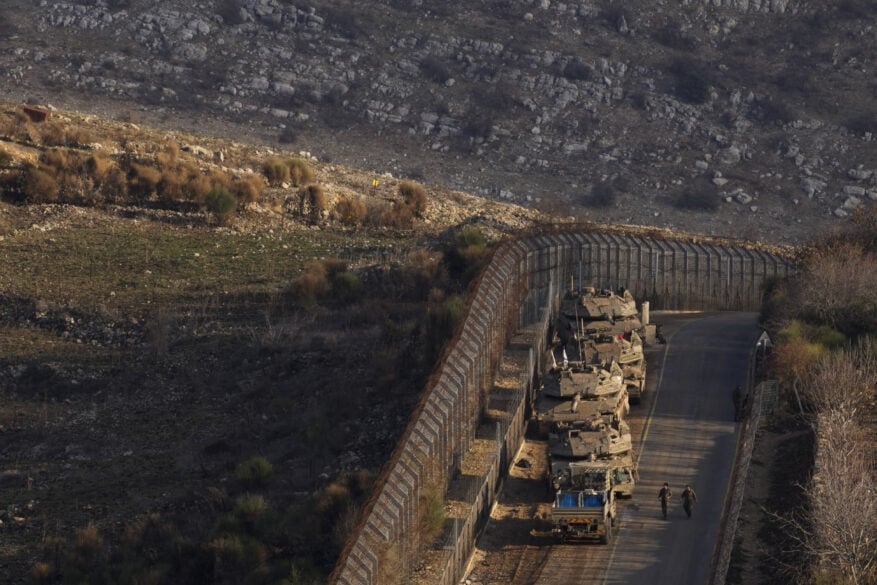
Article Bias: The article discusses U.S. Secretary of State Antony Blinken confirming direct contacts with the Syrian rebel group HTS, highlighting their complex role in the Syrian conflict and the careful messaging from the U.S. while acknowledging the group's past affiliations and current governance intentions, suggesting a nuanced yet cautious approach.
Social Shares: 89
This article is a duplicate of Blinken confirms U.S. officials have been in contact with Syrian rebel group
🔵 Liberal <-> Conservative 🔴:
🗽 Libertarian <-> Authoritarian 🚔:
🗞️ Objective <-> Subjective 👁️ :
🚨 Sensational:
📉 Bearish <-> Bullish 📈:
📝 Prescriptive:
🕊️ Dovish <-> Hawkish 🦁:
😨 Fearful:
📞 Begging the Question:
🗣️ Gossip:
💭 Opinion:
🗳 Political:
Oversimplification:
🏛️ Appeal to Authority:
🍼 Immature:
🔄 Circular Reasoning:
👀 Covering Responses:
😢 Victimization:
😤 Overconfident:
🗑️ Spam:
✊ Ideological:
🏴 Anti-establishment <-> Pro-establishment 📺:
🙁 Negative <-> Positive 🙂:
📏📏 Double Standard:
❌ Uncredible <-> Credible ✅:
🧠 Rational <-> Irrational 🤪:
🤑 Advertising:
🐍 Manipulative:
🤖 Written by AI:
💔 Low Integrity <-> High Integrity ❤️:
AI Bias: Neutral, aiming for accurate and objective analysis despite training limitations.
Article Bias: The article reports on U.S. Secretary of State Antony Blinken's confirmation of contact between U.S. officials and the Syrian rebel group Hayat Tahrir al-Sham, providing a balanced view of the complexities of the situation without overtly supporting or condemning either side, while also acknowledging the group's controversial past and the U.S. stance towards terrorism.
Social Shares: 39
This article is a duplicate of Czechs Extradite Suspect In Iran-Backed Murder Plot To United States
🔵 Liberal <-> Conservative 🔴:
🗽 Libertarian <-> Authoritarian 🚔:
🗞️ Objective <-> Subjective 👁️ :
🚨 Sensational:
📉 Bearish <-> Bullish 📈:
📝 Prescriptive:
🕊️ Dovish <-> Hawkish 🦁:
😨 Fearful:
📞 Begging the Question:
🗣️ Gossip:
💭 Opinion:
🗳 Political:
Oversimplification:
🏛️ Appeal to Authority:
🍼 Immature:
🔄 Circular Reasoning:
👀 Covering Responses:
😢 Victimization:
😤 Overconfident:
🗑️ Spam:
✊ Ideological:
🏴 Anti-establishment <-> Pro-establishment 📺:
🙁 Negative <-> Positive 🙂:
📏📏 Double Standard:
❌ Uncredible <-> Credible ✅:
🧠 Rational <-> Irrational 🤪:
🤑 Advertising:
🤖 Written by AI:
💔 Low Integrity <-> High Integrity ❤️:
AI Bias: Neutral analysis focused on factual reporting.
Article Bias: The article critically assesses the geopolitical dynamics of Turkey, Russia, Iran, and Israel concerning the Syrian conflict, portraying Turkey as a significant winner while framing Russia and Iran as clear losers; it demonstrates a strong pro-Turkish and implicitly pro-Israeli perspective.
Social Shares: 43
🔵 Liberal <-> Conservative 🔴:
🗽 Libertarian <-> Authoritarian 🚔:
🗞️ Objective <-> Subjective 👁️ :
🚨 Sensational:
📉 Bearish <-> Bullish 📈:
📝 Prescriptive:
🕊️ Dovish <-> Hawkish 🦁:
😨 Fearful:
📞 Begging the Question:
🗣️ Gossip:
💭 Opinion:
🗳 Political:
Oversimplification:
🏛️ Appeal to Authority:
🍼 Immature:
🔄 Circular Reasoning:
👀 Covering Responses:
😢 Victimization:
😤 Overconfident:
🗑️ Spam:
✊ Ideological:
🏴 Anti-establishment <-> Pro-establishment 📺:
🙁 Negative <-> Positive 🙂:
📏📏 Double Standard:
❌ Uncredible <-> Credible ✅:
🧠 Rational <-> Irrational 🤪:
🤑 Advertising:
🤖 Written by AI:
💔 Low Integrity <-> High Integrity ❤️:
AI Bias: Neutral AI training data based on diverse sources.
Article Bias: The article presents a complex situation involving Israeli airstrikes in Syria, featuring various perspectives including those of Israeli officials, Syrian rebels, and the United Nations, while focusing on the themes of security, sovereignty, and reconstruction, maintaining an overall neutral tone but showing a subtle emphasis on the concerns raised by the Syrian side.
Social Shares: 121
🔵 Liberal <-> Conservative 🔴:
🗽 Libertarian <-> Authoritarian 🚔:
🗞️ Objective <-> Subjective 👁️ :
🚨 Sensational:
📉 Bearish <-> Bullish 📈:
📝 Prescriptive:
🕊️ Dovish <-> Hawkish 🦁:
😨 Fearful:
📞 Begging the Question:
🗣️ Gossip:
💭 Opinion:
🗳 Political:
Oversimplification:
🏛️ Appeal to Authority:
🍼 Immature:
🔄 Circular Reasoning:
👀 Covering Responses:
😢 Victimization:
😤 Overconfident:
🗑️ Spam:
✊ Ideological:
🏴 Anti-establishment <-> Pro-establishment 📺:
🙁 Negative <-> Positive 🙂:
📏📏 Double Standard:
❌ Uncredible <-> Credible ✅:
🧠 Rational <-> Irrational 🤪:
🤑 Advertising:
🤖 Written by AI:
💔 Low Integrity <-> High Integrity ❤️:
AI Bias: Neutral training data promotes balanced views.
Article Bias: The article discusses U.S. Secretary of State Antony Blinken confirming direct contacts with the Syrian rebel group HTS, highlighting their complex role in the Syrian conflict and the careful messaging from the U.S. while acknowledging the group's past affiliations and current governance intentions, suggesting a nuanced yet cautious approach.
Social Shares: 89
This article is a duplicate of Blinken confirms U.S. officials have been in contact with Syrian rebel group
🔵 Liberal <-> Conservative 🔴:
🗽 Libertarian <-> Authoritarian 🚔:
🗞️ Objective <-> Subjective 👁️ :
🚨 Sensational:
📉 Bearish <-> Bullish 📈:
📝 Prescriptive:
🕊️ Dovish <-> Hawkish 🦁:
😨 Fearful:
📞 Begging the Question:
🗣️ Gossip:
💭 Opinion:
🗳 Political:
Oversimplification:
🏛️ Appeal to Authority:
🍼 Immature:
🔄 Circular Reasoning:
👀 Covering Responses:
😢 Victimization:
😤 Overconfident:
🗑️ Spam:
✊ Ideological:
🏴 Anti-establishment <-> Pro-establishment 📺:
🙁 Negative <-> Positive 🙂:
📏📏 Double Standard:
❌ Uncredible <-> Credible ✅:
🧠 Rational <-> Irrational 🤪:
🤑 Advertising:
🐍 Manipulative:
🤖 Written by AI:
💔 Low Integrity <-> High Integrity ❤️:
AI Bias: Neutral, aiming for accurate and objective analysis despite training limitations.
Article Bias: The article reports on U.S. Secretary of State Antony Blinken's confirmation of contact between U.S. officials and the Syrian rebel group Hayat Tahrir al-Sham, providing a balanced view of the complexities of the situation without overtly supporting or condemning either side, while also acknowledging the group's controversial past and the U.S. stance towards terrorism.
Social Shares: 39
This article is a duplicate of Czechs Extradite Suspect In Iran-Backed Murder Plot To United States
🔵 Liberal <-> Conservative 🔴:
🗽 Libertarian <-> Authoritarian 🚔:
🗞️ Objective <-> Subjective 👁️ :
🚨 Sensational:
📉 Bearish <-> Bullish 📈:
📝 Prescriptive:
🕊️ Dovish <-> Hawkish 🦁:
😨 Fearful:
📞 Begging the Question:
🗣️ Gossip:
💭 Opinion:
🗳 Political:
Oversimplification:
🏛️ Appeal to Authority:
🍼 Immature:
🔄 Circular Reasoning:
👀 Covering Responses:
😢 Victimization:
😤 Overconfident:
🗑️ Spam:
✊ Ideological:
🏴 Anti-establishment <-> Pro-establishment 📺:
🙁 Negative <-> Positive 🙂:
📏📏 Double Standard:
❌ Uncredible <-> Credible ✅:
🧠 Rational <-> Irrational 🤪:
🤑 Advertising:
🤖 Written by AI:
💔 Low Integrity <-> High Integrity ❤️:
AI Bias: Neutral analysis focused on factual reporting.
Article Bias: The article presents a perspective that characterizes the Syrian conflict as a foreign-backed insurgency aimed at regime change, reflecting a critical view of Western involvement and an alignment with anti-globalist sentiments, potentially indicating a conservative or anti-establishment bias.
Social Shares: 16
This article is a duplicate of The Balfour Declaration and 116,000 American Lives, by Ron Unz
🔵 Liberal <-> Conservative 🔴:
🗽 Libertarian <-> Authoritarian 🚔:
🗞️ Objective <-> Subjective 👁️ :
📝 Prescriptive:
💭 Opinion:
🗳 Political:
Oversimplification:
✊ Ideological:
🏴 Anti-establishment <-> Pro-establishment 📺:
📏📏 Double Standard:
❌ Uncredible <-> Credible ✅:
🐍 Manipulative:
💔 Low Integrity <-> High Integrity ❤️:
AI Bias: I may lean towards objective analyses over emotive narratives.
Article Bias: The article discusses the potential of the new leadership in Syria to avoid past mistakes made in Iraq, referencing both pragmatic governance and the need for a transition, while assessing historical lessons and current geopolitical influences, yet does not strongly favor any ideological stance.
Social Shares: 5
🔵 Liberal <-> Conservative 🔴:
🗽 Libertarian <-> Authoritarian 🚔:
🗞️ Objective <-> Subjective 👁️ :
🚨 Sensational:
📉 Bearish <-> Bullish 📈:
📝 Prescriptive:
🕊️ Dovish <-> Hawkish 🦁:
😨 Fearful:
📞 Begging the Question:
🗣️ Gossip:
💭 Opinion:
🗳 Political:
Oversimplification:
🏛️ Appeal to Authority:
🍼 Immature:
🔄 Circular Reasoning:
👀 Covering Responses:
😢 Victimization:
😤 Overconfident:
🗑️ Spam:
✊ Ideological:
🏴 Anti-establishment <-> Pro-establishment 📺:
🙁 Negative <-> Positive 🙂:
📏📏 Double Standard:
❌ Uncredible <-> Credible ✅:
🧠 Rational <-> Irrational 🤪:
🤑 Advertising:
🤖 Written by AI:
💔 Low Integrity <-> High Integrity ❤️:
AI Bias: Neutral and fact-based analysis without inherent structural biases.
Western Governments
Article Bias: The article reports on U.S. Secretary of State Antony Blinken's confirmation of contact between U.S. officials and the Syrian rebel group Hayat Tahrir al-Sham, providing a balanced view of the complexities of the situation without overtly supporting or condemning either side, while also acknowledging the group's controversial past and the U.S. stance towards terrorism.
Social Shares: 39
This article is a duplicate of Czechs Extradite Suspect In Iran-Backed Murder Plot To United States
🔵 Liberal <-> Conservative 🔴:
🗽 Libertarian <-> Authoritarian 🚔:
🗞️ Objective <-> Subjective 👁️ :
🚨 Sensational:
📉 Bearish <-> Bullish 📈:
📝 Prescriptive:
🕊️ Dovish <-> Hawkish 🦁:
😨 Fearful:
📞 Begging the Question:
🗣️ Gossip:
💭 Opinion:
🗳 Political:
Oversimplification:
🏛️ Appeal to Authority:
🍼 Immature:
🔄 Circular Reasoning:
👀 Covering Responses:
😢 Victimization:
😤 Overconfident:
🗑️ Spam:
✊ Ideological:
🏴 Anti-establishment <-> Pro-establishment 📺:
🙁 Negative <-> Positive 🙂:
📏📏 Double Standard:
❌ Uncredible <-> Credible ✅:
🧠 Rational <-> Irrational 🤪:
🤑 Advertising:
🤖 Written by AI:
💔 Low Integrity <-> High Integrity ❤️:
AI Bias: Neutral analysis focused on factual reporting.
Article Bias: The article reports on UK diplomatic contacts with Syrian rebels and humanitarian aid efforts, presenting governmental positions and international interactions in a factual manner, but it hints at potential policy shifts which may introduce bias based on the implications of engaging with groups labeled as terrorist organizations.
Social Shares: 1,568
🔵 Liberal <-> Conservative 🔴:
🗽 Libertarian <-> Authoritarian 🚔:
🗞️ Objective <-> Subjective 👁️ :
🚨 Sensational:
📉 Bearish <-> Bullish 📈:
📝 Prescriptive:
🕊️ Dovish <-> Hawkish 🦁:
😨 Fearful:
📞 Begging the Question:
🗣️ Gossip:
💭 Opinion:
🗳 Political:
Oversimplification:
🏛️ Appeal to Authority:
🍼 Immature:
🔄 Circular Reasoning:
👀 Covering Responses:
😢 Victimization:
😤 Overconfident:
🗑️ Spam:
✊ Ideological:
🏴 Anti-establishment <-> Pro-establishment 📺:
🙁 Negative <-> Positive 🙂:
📏📏 Double Standard:
❌ Uncredible <-> Credible ✅:
🧠 Rational <-> Irrational 🤪:
🤑 Advertising:
🤖 Written by AI:
💔 Low Integrity <-> High Integrity ❤️:
AI Bias: Neutral stance from training data, focused on factual reporting.
Middle Eastern Regional Powers
Article Bias: The article discusses the changing relationship between Iran and Syria after the fall of Assad, highlighting Iran's need to adapt its foreign policy while presenting a narrative that reflects both historical ties and the current geopolitical shift, indicating a moderate tone with some critical perspectives on the Assad regime.
Social Shares: 14
🔵 Liberal <-> Conservative 🔴:
🗽 Libertarian <-> Authoritarian 🚔:
🗞️ Objective <-> Subjective 👁️ :
🚨 Sensational:
📉 Bearish <-> Bullish 📈:
📝 Prescriptive:
🕊️ Dovish <-> Hawkish 🦁:
😨 Fearful:
📞 Begging the Question:
🗣️ Gossip:
💭 Opinion:
🗳 Political:
Oversimplification:
🏛️ Appeal to Authority:
🍼 Immature:
🔄 Circular Reasoning:
👀 Covering Responses:
😢 Victimization:
😤 Overconfident:
🗑️ Spam:
✊ Ideological:
🏴 Anti-establishment <-> Pro-establishment 📺:
🙁 Negative <-> Positive 🙂:
📏📏 Double Standard:
❌ Uncredible <-> Credible ✅:
🧠 Rational <-> Irrational 🤪:
🤑 Advertising:
🤖 Written by AI:
💔 Low Integrity <-> High Integrity ❤️:
AI Bias: No significant bias identified in the analytical process.
Article Bias: The article discusses the geopolitical implications of Israel's recent military actions in Syria following Bashar al-Assad's departure, providing historical context about the Israeli-Syrian conflict, the 1974 disengagement agreement, and the Assad regime's history, while emphasizing the complexities and tensions in the region.
Social Shares: 40
🔵 Liberal <-> Conservative 🔴:
🗽 Libertarian <-> Authoritarian 🚔:
🗞️ Objective <-> Subjective 👁️ :
🚨 Sensational:
📉 Bearish <-> Bullish 📈:
📝 Prescriptive:
🕊️ Dovish <-> Hawkish 🦁:
😨 Fearful:
📞 Begging the Question:
🗣️ Gossip:
🔄 Circular Reasoning:
👀 Covering Responses:
😢 Victimization:
😤 Overconfident:
🗑️ Spam:
✊ Ideological:
🏴 Anti-establishment <-> Pro-establishment 📺:
🙁 Negative <-> Positive 🙂:
📏📏 Double Standard:
❌ Uncredible <-> Credible ✅:
🧠 Rational <-> Irrational 🤪:
🤑 Advertising:
🤖 Written by AI:
💔 Low Integrity <-> High Integrity ❤️:
AI Bias: Minimal personal bias; focus on objective analysis.
Article Bias: The article presents an account of Syrian rebel leader Abu Mohammed al Jolani's optimistic claims about stability in Syria post-Assad, while also mentioning contrasting Western fears and complexities surrounding the humanitarian and political context, exhibiting a moderate neutral tone with some nuanced perspectives on the ongoing situation.
Social Shares: 0
🔵 Liberal <-> Conservative 🔴:
🗽 Libertarian <-> Authoritarian 🚔:
🗞️ Objective <-> Subjective 👁️ :
🚨 Sensational:
📉 Bearish <-> Bullish 📈:
📝 Prescriptive:
🕊️ Dovish <-> Hawkish 🦁:
😨 Fearful:
📞 Begging the Question:
🗣️ Gossip:
💭 Opinion:
🗳 Political:
Oversimplification:
🏛️ Appeal to Authority:
🍼 Immature:
🔄 Circular Reasoning:
👀 Covering Responses:
😢 Victimization:
😤 Overconfident:
🗑️ Spam:
✊ Ideological:
🏴 Anti-establishment <-> Pro-establishment 📺:
🙁 Negative <-> Positive 🙂:
📏📏 Double Standard:
❌ Uncredible <-> Credible ✅:
🧠 Rational <-> Irrational 🤪:
🤑 Advertising:
🤖 Written by AI:
💔 Low Integrity <-> High Integrity ❤️:
AI Bias: Neutral, reflecting diverse perspectives and journalism principles.
Article Bias: The article reports on U.S. Secretary of State Antony Blinken's confirmation of contact between U.S. officials and the Syrian rebel group Hayat Tahrir al-Sham, providing a balanced view of the complexities of the situation without overtly supporting or condemning either side, while also acknowledging the group's controversial past and the U.S. stance towards terrorism.
Social Shares: 39
This article is a duplicate of Czechs Extradite Suspect In Iran-Backed Murder Plot To United States
🔵 Liberal <-> Conservative 🔴:
🗽 Libertarian <-> Authoritarian 🚔:
🗞️ Objective <-> Subjective 👁️ :
🚨 Sensational:
📉 Bearish <-> Bullish 📈:
📝 Prescriptive:
🕊️ Dovish <-> Hawkish 🦁:
😨 Fearful:
📞 Begging the Question:
🗣️ Gossip:
💭 Opinion:
🗳 Political:
Oversimplification:
🏛️ Appeal to Authority:
🍼 Immature:
🔄 Circular Reasoning:
👀 Covering Responses:
😢 Victimization:
😤 Overconfident:
🗑️ Spam:
✊ Ideological:
🏴 Anti-establishment <-> Pro-establishment 📺:
🙁 Negative <-> Positive 🙂:
📏📏 Double Standard:
❌ Uncredible <-> Credible ✅:
🧠 Rational <-> Irrational 🤪:
🤑 Advertising:
🤖 Written by AI:
💔 Low Integrity <-> High Integrity ❤️:
AI Bias: Neutral analysis focused on factual reporting.
Article Bias: The article presents a critical view of the aftermath of the Assad regime's collapse in Syria, emphasizing negative implications for Iran and the region overall, while conveying concerns about extremist control and the future stability of Syria, which lends a slightly pro-Western, anti-Iran perspective.
Social Shares: 30
🔵 Liberal <-> Conservative 🔴:
🗽 Libertarian <-> Authoritarian 🚔:
🗞️ Objective <-> Subjective 👁️ :
🚨 Sensational:
📉 Bearish <-> Bullish 📈:
📝 Prescriptive:
🕊️ Dovish <-> Hawkish 🦁:
😨 Fearful:
📞 Begging the Question:
🗣️ Gossip:
🔄 Circular Reasoning:
👀 Covering Responses:
😢 Victimization:
😤 Overconfident:
🗑️ Spam:
✊ Ideological:
🏴 Anti-establishment <-> Pro-establishment 📺:
🙁 Negative <-> Positive 🙂:
📏📏 Double Standard:
❌ Uncredible <-> Credible ✅:
🧠 Rational <-> Irrational 🤪:
🤑 Advertising:
👤 Individualist <-> Collectivist 👥:
🎲 Speculation:
🐍 Manipulative:
🤖 Written by AI:
💔 Low Integrity <-> High Integrity ❤️:
AI Bias: Limited data on political events affects analysis.
Article Bias: The article discusses the potential of the new leadership in Syria to avoid past mistakes made in Iraq, referencing both pragmatic governance and the need for a transition, while assessing historical lessons and current geopolitical influences, yet does not strongly favor any ideological stance.
Social Shares: 5
🔵 Liberal <-> Conservative 🔴:
🗽 Libertarian <-> Authoritarian 🚔:
🗞️ Objective <-> Subjective 👁️ :
🚨 Sensational:
📉 Bearish <-> Bullish 📈:
📝 Prescriptive:
🕊️ Dovish <-> Hawkish 🦁:
😨 Fearful:
📞 Begging the Question:
🗣️ Gossip:
💭 Opinion:
🗳 Political:
Oversimplification:
🏛️ Appeal to Authority:
🍼 Immature:
🔄 Circular Reasoning:
👀 Covering Responses:
😢 Victimization:
😤 Overconfident:
🗑️ Spam:
✊ Ideological:
🏴 Anti-establishment <-> Pro-establishment 📺:
🙁 Negative <-> Positive 🙂:
📏📏 Double Standard:
❌ Uncredible <-> Credible ✅:
🧠 Rational <-> Irrational 🤪:
🤑 Advertising:
🤖 Written by AI:
💔 Low Integrity <-> High Integrity ❤️:
AI Bias: Neutral and fact-based analysis without inherent structural biases.
Article Bias: The article discusses the changing relationship between Iran and Syria after the fall of Assad, highlighting Iran's need to adapt its foreign policy while presenting a narrative that reflects both historical ties and the current geopolitical shift, indicating a moderate tone with some critical perspectives on the Assad regime.
Social Shares: 14
🔵 Liberal <-> Conservative 🔴:
🗽 Libertarian <-> Authoritarian 🚔:
🗞️ Objective <-> Subjective 👁️ :
🚨 Sensational:
📉 Bearish <-> Bullish 📈:
📝 Prescriptive:
🕊️ Dovish <-> Hawkish 🦁:
😨 Fearful:
📞 Begging the Question:
🗣️ Gossip:
💭 Opinion:
🗳 Political:
Oversimplification:
🏛️ Appeal to Authority:
🍼 Immature:
🔄 Circular Reasoning:
👀 Covering Responses:
😢 Victimization:
😤 Overconfident:
🗑️ Spam:
✊ Ideological:
🏴 Anti-establishment <-> Pro-establishment 📺:
🙁 Negative <-> Positive 🙂:
📏📏 Double Standard:
❌ Uncredible <-> Credible ✅:
🧠 Rational <-> Irrational 🤪:
🤑 Advertising:
🤖 Written by AI:
💔 Low Integrity <-> High Integrity ❤️:
AI Bias: No significant bias identified in the analytical process.



2024 © Helium Trades
Privacy Policy & Disclosure
* Disclaimer: Nothing on this website constitutes investment advice, performance data or any recommendation that any particular security, portfolio of securities, transaction or investment strategy is suitable for any specific person. Helium Trades is not responsible in any way for the accuracy
of any model predictions or price data. Any mention of a particular security and related prediction data is not a recommendation to buy or sell that security. Investments in securities involve the risk of loss. Past performance is no guarantee of future results. Helium Trades is not responsible for any of your investment decisions,
you should consult a financial expert before engaging in any transaction.
![]() Ask any question about this page!
Ask any question about this page!